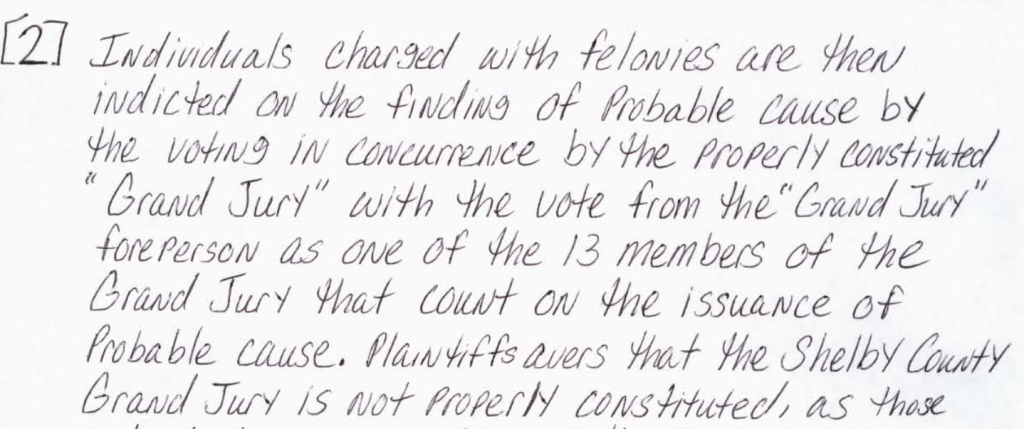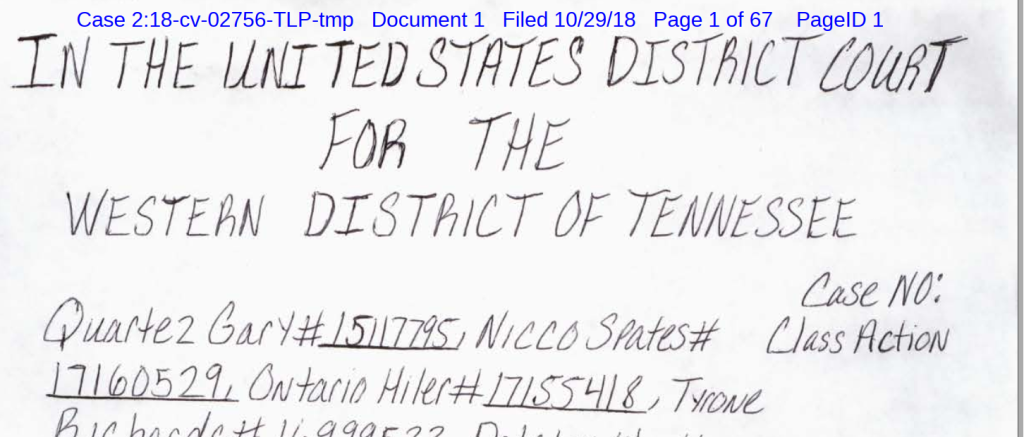RESULTING IN DENIAL OF “DUE PROCESS OF LAW”
by Sharon Rondeau
 (Apr. 28, 2019) — A lawsuit filed in federal court last fall by six inmates at the Shelby County jail in Memphis, TN claims that citizens of the county are subjected to a “routine ‘rubber stamp’ policy and procedure” after they are arrested and incarcerated.
(Apr. 28, 2019) — A lawsuit filed in federal court last fall by six inmates at the Shelby County jail in Memphis, TN claims that citizens of the county are subjected to a “routine ‘rubber stamp’ policy and procedure” after they are arrested and incarcerated.
The class-action suit was filed in the U.S. District Court for the Western District of Tennessee on October 29, 2018 along with three exhibits, and names Shelby County Sheriff Floyd Bonner, Shelby County District Attorney General Amy Weirich, Shelby County Government, former Gov. Bill Haslam, and the State of Tennessee as defendants.
The plaintiffs claim they have been jailed for as long as 40 months without having been provided a grand-jury indictment stating the crime(s) of which they are accused. Alternatively, the suit claims on page 16, “rubber stamped indictments are brought against individuals charged with offenses which are violent and drug related in nature, and taken alone do not objectively give rise to a particularized probable cause…” [sic]
The lawsuit’s claims of protracted imprisonment of the county’s citizens without indictment are not unfamiliar to this publication, which has received scores of letters from Shelby County jail inmates over more than two years with similar complaints.
Underlying the practice of delayed indictment and alleged lack of probable cause, wrote plaintiff Quartez J. Gary in a letter to The Post & Email last week, is the operation of the grand jury itself resulting from its judicially-appointed forepersons who serve multiple terms at the pleasure of the judge.
On pages 13 and 14 of Gary’s handwritten complaint, he alleges that, “On information and belief, the defendants have promulgated, implemented, enforced, carried out and/or failed to rectify a written and/or de facto policy, practice or custom of indicting all individuals placed in the custody of the ‘facility,'” referring to the jail, “without any demonstration or finding of probable cause.” However, on page 31, he states that the process is “designed to deprive an individual of his/her right to due process of law and a fair and speedy trial is a uniform state wide Policy and Procedure…” [sic].
The lawsuit can be accessed here: 3520647-0–8806
Presenting as “Exhibit A” a grand-jury foreman order from September 2012 appointing “Pat Vincent” and reappointing “Mary Thomas” and “Pat Vincent” as grand jury foremen, Gary wrote on the document that “Any indictment Endorsed by mary thomas/J.P Vincent is facially invalid and lacking any legal efficacy.” [sic] 3520647-1–8857
The appointing order is signed by a judge from each of Shelby County’s eight criminal court divisions.
Last August, local media reported that longstanding Shelby County grand-jury foreman Mary Thomas was removed from her position for allegedly having “failed to follow proper procedure on July 31, 2018,” a date that was later changed to “July 17, 2018.” However, documentation The Post & Email acquired from a source as to Thomas’s removal dated August 8, 2018 stated that Thomas “has not been following proper procedure.”
The Post & Email’s calls to the Shelby County Criminal Court for comment on Thomas’s dismissal were not returned.
In August 2016, a relative of a Shelby County inmate informed us that after visiting the Criminal Justice Center in person to request copies of all grand-jury foreman appointing orders for the last eight years, she left empty-handed after the clerk claimed the court held no responsive records.
Gary’s argument as to the composition of the grand jury is similar to one put forth by LCDR Walter Francis Fitzpatrick, III (Ret) in 2009 after discovering that Tennessee grand-jury foremen are “handpicked” by the judge and serve multiple terms, sometimes for decades. As a result of his efforts to expose the practice, Fitzpatrick attempted a citizen’s arrest, legal in Tennessee, but was jailed in Monroe County and later, in McMinn County, then sent to state prison for more than two years in August 2014.
In 2010, longstanding Monroe County grand-jury foreman Gary Pettway said he “worked for the state.” A public records request returned no appointing order, oath of office, or evidence of vetting of Pettway by court personnel.
Weirich was ranked as one of the most ethically-challenged prosecutors among the states of Missouri, California, Louisiana and Tennessee in a study by the Fair Punishment Project encompassing the years 2010-2015. In March 2017, Weirich accepted a “private reprimand” for her conduct in the nationally-covered Noura Jackson case, specifically for her attempts to force Jackson to testify. In exchange, the Board of Professional Responsibility (BOPR) agreed not to prosecute her on ethics complaints.
Pages 29 and 30 of the lawsuit quote from an article in the Memphis Flyer dated July 20, 2017 about Weyrich and her office, citing the Fair Punishment Project’s findings.
As reported by the website prosecutorialaccountability.com, Weirich was noted to have made “improper comments” in the courtroom in the past.
Tennessee district attorneys general wield considerable power and are elected to eight-year terms. Weirich’s current term expires in 2022, at which time she reportedly plans to seek re-election.
At the same time Fitzpatrick was sent to state prison, Jackson’s attorneys successfully appealed her conviction, with the court ruling that “the prosecution violated the defendant’s constitutional right to due process by failing to turn over until after trial the third statement a key witness gave to law enforcement officers investigating the murder.” By that time, Jackson had served nearly a decade in prison.
A deputy prosecutor in Weirich’s office, Steven Jones, was cleared of misconduct allegations for failing to produce exculpatory evidence in Jackson’s case after he claimed he “received the statement during the trial, briefly reviewed it, put it in the flap of a notebook and forgot about it.”
Systemic corruption in the Shelby County prosecutor’s office related to The Post & Email includes the cases of Celitria Watson and April Malone, who were indicted in January 2017 for an alleged drug scheme based on text messages they proved were altered by an unidentified party with the apparent intent of incriminating them. While they were dropped from the case after approximately six months, the women say their reputations and standing in the community remain damaged and their ability to earn a living affected. They, too, have filed a federal lawsuit against Memphis law-enforcement and Weyrich’s office seeking restitution.
In another instance, then-Shelby County jail inmate Datel Taylor insisted he made no confession to investigators who questioned him in the jail about the November 2016 murder of his girlfriend. Rather, he said, he witnessed an investigator instructing a court-reporter present during the questioning to “alter” his statements to indicate a confession.
Although his Shelby County criminal record indicates he accepted a plea agreement, Taylor continues to say he is innocent of the murder, including in a letter received last week from the state prison to which he was sent on a 25-year sentence.
In the case of former Shelby County Sheriff’s Office (SCSO) sergeant Earley Story, overwhelming evidence of his innocence on a 1999 felony conviction of selling marijuana to an undercover officer and confidential informant in 1997 continues to be ignored by the courts despite Story’s continued efforts to clear his name and the backing by a national, congressionally-recognized police-defense organization.
In the federal case of Hobby v. United States, in opining as to whether or not an indictment should be overturned due to alleged discrimination in the selection of a grand-jury foreman, the U.S. Supreme Court claimed that the foreman’s duties are “merely ministerial” and that, assuming his appointment emanated “from an unobjectionable venire,” would not be cause for an indictment to be found invalid.
The “venire” indicates the body of grand jurors chosen to serve for a given amount of time.
In Tennessee’s criminal courts, the grand jury foreman is not chosen from the venire, but rather, through an undisclosed, most likely arbitrary method known only to the judges. However, an 1883 state supreme court case demonstrates that was not always the case, and history shows that the practice commenced after the Tennessee legislature passed a law purported to legitimize it which took effect in 1919.
A 2008 law mandates that no juror may serve without 24 months having elapsed since his last service.
While the state has claimed that grand-jury foremen do not vote and are not “jurors,” as in the federal model, many Tennessee citizens and observers have reported that the grand jury foreman does, indeed, cast a vote when considering an indictment, particularly in the case of a tie among the remaining 12 grand jurors. In fact, when Fitzpatrick was arrested following the citizen’s arrest on April 1, 2010, he was charged with “intimidating a juror,” namely, Pettway.
On page 3, Gary claims that the grand-jury foreman casts a vote.

Tennessee law dictates that all jurors be chosen through “random, automated means.” The grand jurors’ term of service is said to be two months, while for the foreman, it is two years.
Weyrich’s office is open about the fact that it “hires” the grand jury foreman and states that grand jurors are “selected by the administrative judge of Criminal Court.”
After testifying in Shelby County in August 2016 for only minutes before being expelled from the witness chair by Judge Lee Coffee, one of the signers of the 2012 appointing order included in Gary’s suit, Fitzpatrick related his discovery that Shelby County judges also appoint a “grand jury foreman pro tempore,” a position not found in Tennessee code.
In 2012, Fitzpatrick discovered state laws from 1984, never repealed nor amended, which ordered the county criminal courts to reorganize into multi-county districts, with several exceptions for large counties such as Shelby and Knox designated to remain their own respective districts. As far as this publication has been able to determine over 9+ years of coverage, the laws were never observed other than for the numbering of judicial districts, as in Shelby County’s designation as Tennessee’s 30th Judicial District.
In 2010, an attorney for Fitzpatrick termed Tennessee’s judicial system “hopelessly corrupted.”
The additional exhibits included with Gary’s lawsuit are his case history summary and six grand-jury indictments issued respectively against the plaintiffs signed by either Thomas or Vincent.
Fergus Nolan of Memphis Truth Commission has uncovered additional prosecutorial corruption in Shelby County involving Story’s confidential informant, Alfredo Shaw, who testified at not only Story’s trial but also that of a death-row inmate, Tony Carruthers. Shaw has since recanted his testimony, but Carruthers remains in Tennessee’s maximum-security facility, Riverbend.

